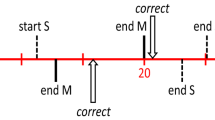Abstract
The paper we present is a case study which has two objectives: the identification of the interactions between pairs of 16 and17-year-old students related to problem solving and the influence of such interactions in their cognitive development. To achieve these aims, we consider problems associated with a definite conceptual structure – problems comparing flat surface areas –, and we focus the analysis of the interactions on the point of view of the thematic and interlocutive dimensions of the discourse. Such analysis has allowed us to identify a wide typology of exchanges, and, from this, to outline four models of interaction -alternative, guided, relaunching, and co-operative. In the cases analysed, these interactions significantly influence the individual development of cognitive and heuristic abilities in the problem solving process.
Similar content being viewed by others
REFERENCES
Balacheff, N.: 1990, 'Future perspectives for research in the Psychology of Mathematics Education', in Nesher, P. and Kilpatrick, J. (eds), Mathematics and Cognition, Cambridge University Press, New York.
Balacheff, N.: 1991, 'Treatment of refutations: Aspects of the complexity of a constructivist approach to mathematics learning', in von Glasersfeld, E. (ed.), Radical constructivism in mathematics education, Kluwer Academic Publishers, Dordrecht, pp. 89-110.
Brown, G. and Yule, G.: 1993, 'Análisis del discurso', Visor Libros, Madrid.
Calsamiglia, H. and Tusón, A.: 1999, 'Las cosas del decir, Manual de análisis del discurso, Ariel Lingüística, Barcelona.
Cesar, M.: 1998, 'Social Interactions andMathematics Learning', in MEAS 1 Proceedings, Nottingham University, Nottingham, pp. 110-119.
Cobb, P. and Whitenack, J.W.: 1996,. 'A Method Conducting Longitudinal Analyses of Classroom Videorecordings and Transcripts', Educational Studies in Mathematics 30, 213-228.
Cobo, P.: 1998, 'Análisis de los procesos cognitivos y de las interacciones sociales entre alumnos (16-17) en la resolución de problemas que comparan áreas de superficies planas. Un estudio de casos'. Doctoral Dissertation, Universitat Autònoma de Barcelona, Unpublished.
Forman, E.: 1989, 'The Role of Peer Interaction in the Social Construction of mathematical Knowledge', International Journal of Education Research 13, 55-70.
Gumperz, J.J. and Hymes, G.: 1972, 'Introduction', in Directions in Sociolinguistics. The Ethnography of Communication, Basil Blackwell, New York.
Hearth, S.T.: 1981, A History of Greek Mathematics, Volume I and II, Dover, New York.
Hershkowitz, R. and Schwarz, B.: 1999, 'The emergent perspective in rich learning environments: some roles of tools and activities in the construction of sociomathematical norms', Educational Studies in Mathematics 39, 149-166.
Kerbrat-Orecchioni, C.: 1990-1994, Les interactions verbales, Tomos I, II and III, Armand Colin, Paris.
Kieren, T.E.: 2000, 'Dichotomies or Binoculars: Reflections on the papers by Steffe and Thompson and by Lerman', Journal for Research in Mathematics Education 31, 2, 228-233
Lambdin, D.V.: 1993, 'Monitoring Moves and Roles in Co-operative Mathematical Problem Solving', Focus on Learning Problems in Mathematics, Spring & Summer Editions 15, numbers 2 & 3, pp. 48-64.
Lester, F.K. Jr.: 994, 'Musings about mathematical problem-solving research: 1970-1994', Journal for Research in Mathematics Education 25, 660-675.
Mercer, N.: 1995, The Guided Construction of Knowledge. Talk amongst Teachers and Learner, Multilingual, Matters Ltd., Clevedon.
Perret-Clermont, A.-N.: 1996, La construction de l'intelligence dans l'interaction social, Peter Lang, Berna.
Roulet, E. et al.: 1987, L'articulation du discours en français contemporain, Peter Lang, Berna.
Schoenfeld, A.H.: 1985, Mathematical Problem Solving, Academic Press, Inc. Orlando.
Webb, N.M.: 1984, 'Interacción entre estudiantes y aprendizaje en grupos pequeños'. Infancia y Aprendizaje 27/28, 159-183.
Webb, N.M.: 1989, 'Peer Interaction and Learning in Small Groups', international Journal of Education Research 13, 21-39.
Webb, N.M.: 1991, 'Task-Related Verbal Interaction and Mathematics Learning in Small Groups', Journal for Research in Mathematics Education 22, 5, 366-389.
Wood, T.: 1996, 'Events in Learning Mathematics: Insights from Research in Classrooms', Educational Studies in Mathematics 30, 85-105.
Yackel, E. and Cobb, P.: 1996, 'Social norms, argumentation, and autonomy in Mathematics', Journal for Research in Mathematics Education 27, 4, 458-477.
Yackel, E., Cobb, P. and Wood, T.: 1991, 'Small-group Interactions as a Source of Learning Opportunities in Second-Grade Mathematics', Journal for Research in Mathematics Education 22, 5, 390-408.
Author information
Authors and Affiliations
Rights and permissions
About this article
Cite this article
Cobo, P., Fortuny, J.M. Social interactions and cognitive effects in contexts of area-comparison problem solving. Educational Studies in Mathematics 42, 115–140 (2000). https://doi.org/10.1023/A:1004187711956
Issue Date:
DOI: https://doi.org/10.1023/A:1004187711956




